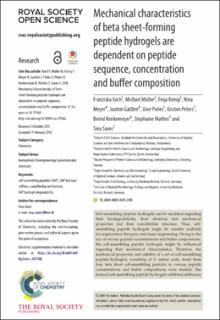Please use this identifier to cite or link to this item:
https://doi.org/10.21256/zhaw-28950| Publication type: | Article in scientific journal |
| Type of review: | Peer review (publication) |
| Title: | Mechanical characteristics of beta sheet-forming peptide hydrogels are dependent on peptide sequence, concentration and buffer composition |
| Authors: | Koch, Franziska Müller, Michael König, Finja Meyer, Nina Gattlen, Jasmin Pieles, Uwe Peters, Kirsten Kreikemeyer, Bernd Mathes, Stephanie Saxer, Sina |
| et. al: | No |
| DOI: | 10.1098/rsos.171562 10.21256/zhaw-28950 |
| Published in: | Royal Society Open Science |
| Volume(Issue): | 5 |
| Issue: | 3 |
| Page(s): | 171562 |
| Issue Date: | 2018 |
| Publisher / Ed. Institution: | The Royal Society Publishing |
| ISSN: | 2054-5703 |
| Language: | English |
| Subjects: | SAP hydrogel degradability; SAP hydrogel stiffness; Nanofibrillar architecture; Self-assembling peptides (SAP) |
| Subject (DDC): | 660: Chemical engineering |
| Abstract: | Self-assembling peptide hydrogels can be modified regarding their biodegradability, their chemical and mechanical properties and their nanofibrillar structure. Thus, self-assembling peptide hydrogels might be suitable scaffolds for regenerative therapies and tissue engineering. Owing to the use of various peptide concentrations and buffer compositions, the self-assembling peptide hydrogels might be influenced regarding their mechanical characteristics. Therefore, the mechanical properties and stability of a set of self-assembling peptide hydrogels, consisting of 11 amino acids, made from four beta sheet self-assembling peptides in various peptide concentrations and buffer compositions were studied. The formed self-assembling peptide hydrogels exhibited stiffnesses ranging from 0.6 to 205 kPa. The hydrogel stiffness was mostly affected by peptide sequence followed by peptide concentration and buffer composition. All self-assembling peptide hydrogels examined provided a nanofibrillar network formation. A maximum self-assembling peptide hydrogel dissolution of 20% was observed for different buffer solutions after 7 days. The stability regarding enzymatic and bacterial digestion showed less degradation in comparison to the self-assembling peptide hydrogel dissolution rate in buffer. The tested set of self-assembling peptide hydrogels were able to form stable scaffolds and provided a broad spectrum of tissue-specific stiffnesses that are suitable for a regenerative therapy. |
| URI: | https://digitalcollection.zhaw.ch/handle/11475/28950 |
| Fulltext version: | Published version |
| License (according to publishing contract): | CC BY 4.0: Attribution 4.0 International |
| Departement: | Life Sciences and Facility Management |
| Appears in collections: | Publikationen Life Sciences und Facility Management |
Files in This Item:
| File | Description | Size | Format | |
|---|---|---|---|---|
| 2018_Koch-etal_Mechanical-characteristics-of-beta-sheetforming-peptide-hydrogels_RoyalSociety.pdf | 1.11 MB | Adobe PDF |  View/Open |
Show full item record
Koch, F., Müller, M., König, F., Meyer, N., Gattlen, J., Pieles, U., Peters, K., Kreikemeyer, B., Mathes, S., & Saxer, S. (2018). Mechanical characteristics of beta sheet-forming peptide hydrogels are dependent on peptide sequence, concentration and buffer composition. Royal Society Open Science, 5(3), 171562. https://doi.org/10.1098/rsos.171562
Koch, F. et al. (2018) ‘Mechanical characteristics of beta sheet-forming peptide hydrogels are dependent on peptide sequence, concentration and buffer composition’, Royal Society Open Science, 5(3), p. 171562. Available at: https://doi.org/10.1098/rsos.171562.
F. Koch et al., “Mechanical characteristics of beta sheet-forming peptide hydrogels are dependent on peptide sequence, concentration and buffer composition,” Royal Society Open Science, vol. 5, no. 3, p. 171562, 2018, doi: 10.1098/rsos.171562.
KOCH, Franziska, Michael MÜLLER, Finja KÖNIG, Nina MEYER, Jasmin GATTLEN, Uwe PIELES, Kirsten PETERS, Bernd KREIKEMEYER, Stephanie MATHES und Sina SAXER, 2018. Mechanical characteristics of beta sheet-forming peptide hydrogels are dependent on peptide sequence, concentration and buffer composition. Royal Society Open Science. 2018. Bd. 5, Nr. 3, S. 171562. DOI 10.1098/rsos.171562
Koch, Franziska, Michael Müller, Finja König, Nina Meyer, Jasmin Gattlen, Uwe Pieles, Kirsten Peters, Bernd Kreikemeyer, Stephanie Mathes, and Sina Saxer. 2018. “Mechanical Characteristics of Beta Sheet-Forming Peptide Hydrogels Are Dependent on Peptide Sequence, Concentration and Buffer Composition.” Royal Society Open Science 5 (3): 171562. https://doi.org/10.1098/rsos.171562.
Koch, Franziska, et al. “Mechanical Characteristics of Beta Sheet-Forming Peptide Hydrogels Are Dependent on Peptide Sequence, Concentration and Buffer Composition.” Royal Society Open Science, vol. 5, no. 3, 2018, p. 171562, https://doi.org/10.1098/rsos.171562.
Items in DSpace are protected by copyright, with all rights reserved, unless otherwise indicated.